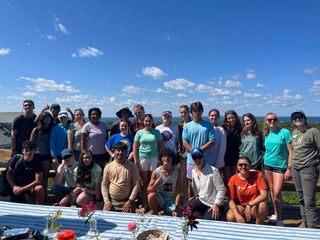Programs Blog
A Day of Adventure and Education at Sea!

July 30, 2023
Riley, Graicen, Ruthie, Ayman
Ship’s Log
Noon Position
42deg 53.2’N x 070deg 42.1’W
Ship Heading
045
Ship Speed
2 kts
Log (nm)
273.9
Weather / Wind / Sail Plan
Skies overcast / NW x N Beaufort Force 3 / Four lowers
Description of location
Gulf of Maine, south of Appledore Island
Last night, a weather system moved through that brought a lot of wind and rain. Captain Ryan knew the system was coming and had already rigged jacklines and reduced sail. Graicen could see the pressure dropping during the hourly weather checks in the afternoon. By evening watch, the gale was upon us. The rain came down and the wind picked up. Ayman said that he had never experienced rain while on the water before. It felt like it was raining in a bathtub. Captain Ryan restricted the deck and hove-to to sit out the weather. Everybody congregated in the main saloon and some people started feeling seasick. Everyone tried to go to bed. The on watch and some seasick folks gathered in the lab and told stories and read The Grinch who Stole Christmas to keep our minds occupied. Not long after, all students were stood down and went to bed. The professional crew stayed up and watched the boat. At 5:30, A watch got up to get the boat sailing again. We got to set the jib and the mains’l. It took A watch and B watch to set the main, there were 12 people on the halyard. Then we sailed and did some science, and B watch both did the deployment and processed everything before the end of watch!
In the afternoon, we anchored off Appledore Island and got to visit the Isle of Shoals Marine Lab, which is operated by the University of New Hampshire and Cornell University. Kelly Morgan, Programs Director, and former SEA Assistant Scientist gave us a tour. We saw a lot of seagulls, because it’s a colony for seagulls, and they were very loud and all over the place. We realized that seagulls are only called seagulls when you’re on land, but when you’re at sea, you just call them gulls. As Kelly said, “We were the guests on their island.” The island was home to an abundant ecosystem with seals, sharks, birds, crabs, and plants that included a unique environment with tidal pools, steep cliffs, and grassy knolls. The island’s history was diverse going from an Indigenous community to a resort, to a painter’s retreat, to a military base, to a field station. 90% of the island is run on sustainable energy, and the area around the field station was covered in solar panels and wind turbines. Even the toilets were composting. We also got to explore the intertidal and look for critters and saw anemones, crabs, shrimp, snails, isopods, seaweed and some old bones. The gulls even tried to go through our bags while we were wandering. Then it was time to head back to the ship. The ship looked so tiny from the shore, and it was wild how we could all fit on it and have so much space! Coming back to the ship felt like coming home.
Signing out,
Riley, Graicen, Ruthie, Ayman
 Students tidepooling and looking out at the Corwith Cramer
Students tidepooling and looking out at the Corwith Cramer
Recent Posts from the Ships
- Ocean Classroom 2024-A collaborative high school program with Proctor Academy
- Collaborations and Long-term Commitments: SEA’s Caribbean Reef Program Sets a Course for Coastal Programs that Compliment Shipboard Experiences.
- Sea Education Association students prepare for life underway using state of the art nautical simulation from Wartsila Corporation.
- SEA Writer 2022, Magazines From the Summer SEA Quest Students
- Technology@SEA: Upgrades Allow Insight into Ocean Depths
Programs
- Gap Year
- Ocean Exploration
- High School
- Science at SEA
- SEA Expedition
- SEAScape
- Pre-College
- Proctor Ocean Classroom
- Protecting the Phoenix Islands
- SPICE
- Stanford@SEA
- Undergraduate
- Climate and Society
- Climate Change and Coastal Resilience
- Coral Reef Conservation
- Marine Biodiversity and Conservation
- MBL
- Ocean Exploration: Plastics
- Ocean Policy: Marine Protected Areas
- Oceans and Climate
- Pacific Reef Expedition
- The Global Ocean: Hawai'i
- The Global Ocean: New Zealand